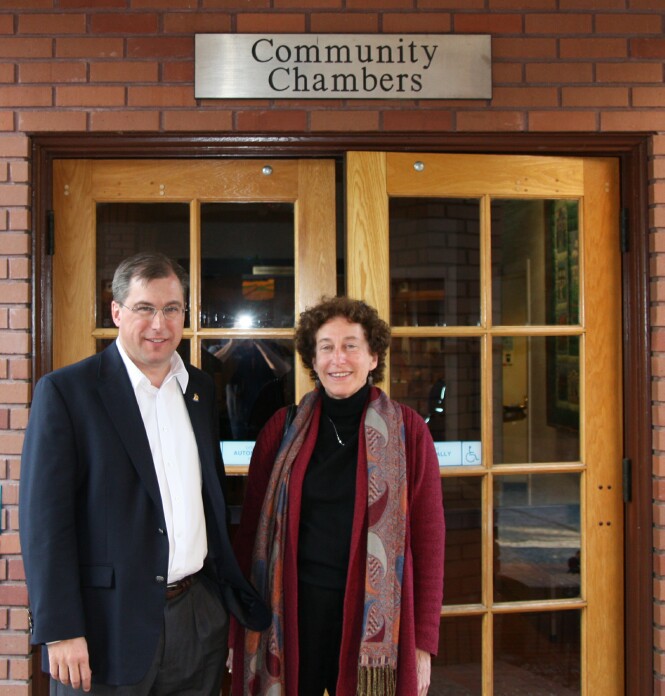 Last spring, the council had the option of at least discussing whether or not to reconsider the city attorney contract. They declined to even pull it off the dissent calendar, even though there was a rising chorus of complaints in the community.
Last spring, the council had the option of at least discussing whether or not to reconsider the city attorney contract. They declined to even pull it off the dissent calendar, even though there was a rising chorus of complaints in the community.
Since that time, the council has gone through a complete turnover in the last two election cycles. The senior members of council – Mayor Joe Krovoza and Councilmember Rochelle Swanson – were elected in just 2010.
In fact, the city staff has also been completely remade, with a new city manager, finance director, and general manager of utilities. It has been remade except for City Attorney Harriet Steiner.
Crown Castle presented an opportunity to perhaps push back against strong monied interests, which were able to lobby Congress and the State Legislature to give these telecommunications companies special status and usurp the right of local control.
Dan Wolk – who was soundly criticized at the time – was the only one willing to take a chance in court and fight back against the proposed communications array by Crown Castle.
The mayor said pointedly, “I don’t believe this community can even begin to afford going into a lawsuit on this matter. ” He added: “It would be frivolous, unnecessary and I’m not going to put staff time into that or the citizens’ money into that… Lots of things are going to fall off the budget in June and that’s at the top of my mind.”
Privately, a number of people told me that other communities have fought back and won. Perhaps this wasn’t the fight, perhaps it was.
The point here is not necessarily that the city attorney was wrong, but rather than she was risk-averse, or at least selectively risk-averse.
Last November, just as the water referendum had achieved enough signatures to qualify for the ballot and give the residents of a Davis a chance to vote on the newly-imposed water rates, the city released a last-second legal brief by City Attorney Harriet Steiner who wrote, “In our opinion, the City’s newly-adopted water rates are not subject to challenge by referendum.”
Not everyone agreed with that legal analysis, however. The city attorney at the time acknowledged there was a lack of case law, “We must note that there are no post-Proposition 218 cases that are directly on point.”
Her argument is that the absence of reference to referendum in a Prop 218 situation suggests a continuation of prior case law.
“Proposition 218 expressly allows initiatives to reduce or repeal any local tax, assessment, fee or charge. However, Proposition 218 only addresses initiatives and it is silent with respect to the power of the referendum.”
Harriet Steiner opines, “In our opinion, this silence leads to the conclusion that prior case law is still valid and that water and other utility rates adopted pursuant to Proposition 218 are not subject to challenge by referendum.”
Council was adept enough to dodge this political land mine and ultimately set the city out on the proper course of studying the issue and putting it to a vote of the people. Unfortunately, Harriet Steiner has attempted to thwart that, as well.
Harriet Steiner and Iris Yang, her colleague at Best, Best and Krieger, who works as the city attorney for Paso Robles, told the council back in October, “The problem with a binding measure is, one it’s difficult to know what the scope of that would be…”
She argued it was difficult in a yes or no question for the council to know what it meant if the voters said the council shall not participate in the water project. She argued the converse was also true, if the voters said the city shall participate, “does that mean under any circumstance?”
“Having a measure that purports to be binding really confuses the issue because it really doesn’t tell you what your limitations are,” she argued.
These two attorneys, using no real legal analysis and citing no legal precedent and authority, managed to convince five council members, three of whom are attorneys, to go with an advisory vote rather than a binding one.
There is no compelling legal reason offered by either Ms. Yang or Davis’ City Attorney Harriet Steiner.
Iris Yang threw out a huge straw man when she said that if 80 percent of the voters voted against the project, “and you went against them, then I think you would find out what would happen at the next election as to whether or not they appreciate the consideration that was given to the outcome of that vote.”
She said, “The same thing is going to happen a few weeks later when the property owners are going to vote on the rate increase, if you get a majority protest and the rate increase is not approved, then that’s going to restrict what you can do with respect to that project.”
“You’re going to have a pretty clear reading, it seems to me from those two ballot measures,” Ms. Yang said.
I agree with her, if this looks like a Measure P or even a Measure X scale “no vote,” there is no doubt. It’s easy to govern when there is broad consensus.
The problem is that it seems just as likely, if not more likely, to be a far closer vote.
The last question involves what the rate structure will look like. WAC members Frank Loge and Matt Williams have developed an innovative rate structure that would more fairly capture the fixed portions of the rates.
But legal counsel is adamantly opposed to it. Why? Mainly because it is untested legally and they are afraid of having to defend a lawsuit. Never mind that a rate structure similar the current rate structure in the city of Davis has been challenged in a court of law down in Palmdale and was invalidated.
When you add up all of the above, we come to the conclusion that now is the time to decide that the city attorney has become a barrier to the kind of substantive reform that this council appears to desire.
There have been two schools of thought here, and one is that Harriet Steiner is the one who, as city attorney, knows where the proverbial bodies are buried, and can therefore be an asset in helping reform.
Moreover, in a time of new council and city management leadership, she remains the one with the institutional memory.
On the other hand, as we just noted, perhaps it is simply the case now that Harriet Steiner is part of the problem – and in fact, a part of a number of different problems that are a hindrance rather than an aid to change.
The Zipcar situation has largely resolved itself in a manner favorable to the city, but it is true that the original contract was not nearly as tight as it should have been. And in fact, as many pointed out, what was contained in the written contract was not what the city was purporting it to be.
The city may have had oral assurances, but the city attorney left language wide open that could have exposed the city to enormous liabilities and commitments.
Then you have the DCEA (Davis City Employees Association) impasse that has cost the city at least $800,000.
The impasse was the city’s screw-up. They imposed impasse before they had exhausted other remedies. And frankly, they used impasse at the wrong time, with the wrong bargaining group. They should have used it with the firefighters at the start of the process, rather than the rank and file at the end, to simply bring them up to the inadequate contract that the rest had.
We believe it is time for this council to find a city attorney who can help the new council find new innovative ways to address current issues, and we believe that this city attorney is in the way in that regard.
As the advisory vote, the rate structure and the referendum show, not only is the city attorney cautious, she’s not even using case law and current legal authority to justify her opinions. In none of those instances did the city attorney cite the law to tell the council why they could not do something. That seems to be the heart of the problem.
The bottom line is that, after 26 years, it is time for the city of Davis to look in a different direction. With a new council and clearly some questionable advice, this may be the opportunity to do so. It appears the city needs a fresh start.
—David M. Greenwald reporting






And DACHA?
I intentionally avoided DACHA – too split, too contentious. Some people will argue that DACHA is the reason she should go, some that it’s the reason she should stay. So why muddy the waters when there’s ample evidence outside of DACHA?
Agree I suppose, but fact that her role has been controversial here too was my point. We an disagree:enjoy your Sunday!
Add another one to the list: the animal control contract with USDA. Extremely poorly written and obviously gave Davis no control of those federal officers who are known to kill the animals as the first and only option
I went to the coyote murder CC hearing, and it was appalling to watch the City Attorney stammer around and the CC gave her a pass. Again.
So many stories …
Mayor Joe:
I don’t think you see it because you’re too close to the problem, but if you step back into the audience where we are, I think you would see that most of the many debacles besetting your term were inherited, most caused by poor staff recommendations over the years, and your City Attorney has been either the cause, or a failed gatekeeper, for most if it.
I had two votes to fire her in 2000, but not a third. Too bad.
[i]”They declined to even pull it off the [b]dissent[/b] calendar …”[/i]
Consent calendar?
I don’t have a strong opinion one way or the other about keeping or firing Harriet Steiner*. However, I believe that the best case to be made for the latter option is the DCEA case. As you noted, it cost the City $800,000. That was due entirely to the Council following the advice she gave, which (in her words) gave the City unilateral authority to withdraw from fact-finding if in the City’s opinion the union was not co-operating (I think she called it dragging their feet).
I am not a lawyer, but once I read the operative City ordinance, it was patently clear to me that Harriet’s legal advice was bad. (I should state that I never saw that 1973 document until after the PERB arbitrator had initially sided with the DCEA against the City.) I don’t know if the five people on our Council ever looked at the 1973 document. But I think anyone with reasonable intelligence, who read it, would agree that the City had no authority to unilaterally decide that the DCEA was not sufficiently cooperative and that the City had the unilateral right mid way through the process to impose its terms.
*One thing to keep in mind is that every human being makes some mistakes. Just because Harriet has made some does not make her uniquely bad. If she were let go, the person who replaced her would, given enough time, make some mistakes, too. The real advantage at this point of not firing Harriet is that, because she has been around a long time, she has institutional memory the others in top positions lack. So, for example, if we face problems like we did with the DCEA, those same mistakes can be avoided due to Harriet now knowing where things went wrong.
There’s a reason why we put it in italics.
“Is Davis’ City Attorney Too Cautious For Bold New Council?”
Am I the only one seeing the irony here? If the new Council is so bold, why are they following the cautious legal advice? What would a MEEK new Council do, disregard the advice?
-Michael Bisch
Getting back to Neighborhood Partners, when Steiner had to choose between doing the legal thing, or doing the illegal and dishonest action which would benefit NP, she chose the later. It would seem she should go, but maybe it’s not the council’s choice to make.
Harriet Steiner and her firm may be be and have good attorneys but I do not see evidence that they are. Who has read the fully unredacted report on the fire department written several years ago other than the previous City Manager and Harriet Steiner and of course the writer. Secrecy is not a plan it is a policy too often used by the city. Open Government is far better and allows the citizens to actually participate in the governing and policies they have to live with.
David, this CC is not bold. Same old. Nothing has changed from my perspective